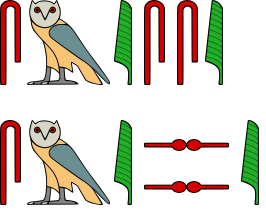I didn’t say it mattered about the culture of the name, only the heka of the name (apart from the ren, which like, is an Egyptian concept so it might matter there, idk it’s above my paygrade).
So the idea that names don’t matter in this tradition is something I’d contest slightly, b/c heka is fundamental to this tradition, it’s woven through everything we say or do, it’s woven through our mythology and the existence of the Gods.
Tbh I’m not sure where the “culture” bit is coming from just b/c I haven’t seen people discussing chosen or religious names from other cultures in this thread yet? If you’re referring to non-chosen names from other cultures, the kind given by parents at birth, then those are a very different kettle of fish.
I find the method of giving names at birth and having people keep them until they die honestly bizarre to the point of being concerning. If some total strangers who didn’t know me, couldn’t even see me, walked up to the wall I was behind and yelled “YOUR NAME IS DAVID NOW”, would I go “ok sure” and just start using that for the rest of my life? Lol? Why would I do that? I wouldn’t do that, would you?
So why do we do that to babies. Even if we insist that a name has to be “given”, why don’t we have some ceremony when a child reaches or gets closer to adulthood, when they get their “adult name”, like actually happens in some cultures IIRC? A name based on who they are, not some assumptions about who the parents want them to be or what the parents think “sounds nice”.
The heka of being given a name at birth and keeping it is so awful. It’s pure pot luck whether your name is great, awful or somewhere in between, or whether you even like it. What a weird cultural tradition.
Anyway, no, it doesn’t matter what culture the name is from. As long as it takes into consideration the heka.
This is where I point out that you’re not stuck with your birth name if you’re bored with it, don’t like it, or don’t vibe the heka, anybody can change it for any or no reason in the UK. I met a doctor who learned I changed my name and she went “Oh, I wish I could’ve done that, I never liked my name” and I was like, “Well, you can, anybody can :D” and watching her eyes widen was a trip.
 Although I’ve always liked the name Mereret (she was a daughter of Senusret III, a 12th Dynasty king).
Although I’ve always liked the name Mereret (she was a daughter of Senusret III, a 12th Dynasty king).